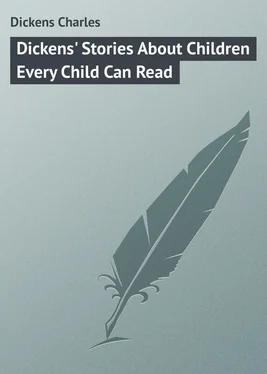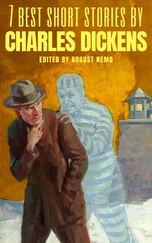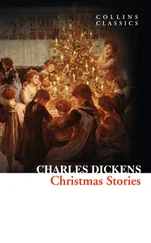Charles Dickens - Dickens' Stories About Children Every Child Can Read
Здесь есть возможность читать онлайн «Charles Dickens - Dickens' Stories About Children Every Child Can Read» — ознакомительный отрывок электронной книги совершенно бесплатно, а после прочтения отрывка купить полную версию. В некоторых случаях можно слушать аудио, скачать через торрент в формате fb2 и присутствует краткое содержание. Издательство: Иностранный паблик, Жанр: foreign_prose, на английском языке. Описание произведения, (предисловие) а так же отзывы посетителей доступны на портале библиотеки ЛибКат.
- Название:Dickens' Stories About Children Every Child Can Read
- Автор:
- Издательство:Иностранный паблик
- Жанр:
- Год:неизвестен
- ISBN:нет данных
- Рейтинг книги:4 / 5. Голосов: 1
-
Избранное:Добавить в избранное
- Отзывы:
-
Ваша оценка:
- 80
- 1
- 2
- 3
- 4
- 5
Dickens' Stories About Children Every Child Can Read: краткое содержание, описание и аннотация
Предлагаем к чтению аннотацию, описание, краткое содержание или предисловие (зависит от того, что написал сам автор книги «Dickens' Stories About Children Every Child Can Read»). Если вы не нашли необходимую информацию о книге — напишите в комментариях, мы постараемся отыскать её.
Dickens' Stories About Children Every Child Can Read — читать онлайн ознакомительный отрывок
Ниже представлен текст книги, разбитый по страницам. Система сохранения места последней прочитанной страницы, позволяет с удобством читать онлайн бесплатно книгу «Dickens' Stories About Children Every Child Can Read», без необходимости каждый раз заново искать на чём Вы остановились. Поставьте закладку, и сможете в любой момент перейти на страницу, на которой закончили чтение.
Интервал:
Закладка:
Suppose it should not be done enough! Suppose it should break in turning out! Suppose somebody should have got over the wall of the back yard and stolen it, while they were merry with the goose – a supposition at which the two young Cratchits became livid! All sorts of horrors were supposed.
Halloo! A great deal of steam! The pudding was out of the copper. A smell like a washing-day! That was the cloth. A smell like an eating-house and a pastrycook's next door to each other, with a laundress' next door to that! That was the pudding! In half a minute Mrs. Cratchit entered – flushed, but smiling proudly – with the pudding like a speckled cannon-ball, so hard and firm, blazing in half of half-a-quartern of lighted brandy, and decorated with Christmas holly stuck into the top.
Oh, a wonderful pudding! Bob Cratchit said, and calmly too, that he regarded it as the greatest success achieved by Mrs. Cratchit since their marriage. Mrs. Cratchit said that, now the weight was off her mind, she would confess she had her doubts about the quantity of flour. Everybody had something to say about it, but nobody said or thought it was a small pudding for a large family. It would have been really wicked to do so. Any Cratchit would have blushed to hint at such a thing.
At last the dinner was all done, the cloth was cleared, the hearth swept, and the fire made up. The hot stuff in the jug being tasted, and considered perfect, apples and oranges were put upon the table, and a shovel full of chestnuts on the fire. Then all the Cratchit family drew round the hearth in what Bob Cratchit called a circle, meaning half a one; and at Bob Cratchit's elbow stood the family display of glass. Two tumblers and a custard cup without a handle.
These held the hot stuff from the jug, however, as well as golden goblets would have done; and Bob served it out with beaming looks, while the chestnuts on the fire sputtered and cracked noisily. Then Bob proposed:
"A merry Christmas to us all, my dears. God bless us!"
Which all the family re-echoed.
"God bless us everyone!" said Tiny Tim, the last of all.
Now I told you that Mr. Scrooge had some disagreeable and wonderful dreams on Christmas eve, and so he had; and in one of them he dreamt that a Christmas spirit showed him his clerk's home; he saw them all gathered round the fire, and heard them drink his health, and Tiny Tim's song, and he took special note of Tiny Tim himself.
How Mr. Scrooge spent Christmas day we do not know. He may have remained in bed, having a cold, but on Christmas night he had more dreams, and in one of his dreams the spirit took him again to his clerk's poor home. The mother was doing some needlework, seated by the table, a tear dropped on it now and then, and she said, poor thing, that the work, which was black, hurt her eyes. The children sat, sad and silent, about the room, except Tiny Tim, who was not there. Upstairs the father, with his face hidden in his hands, sat beside a little bed, on which lay a tiny figure, white and still. "My little child, my pretty little child," he sobbed, as the tears fell through his fingers on to the floor. "Tiny Tim died because his father was too poor to give him what was necessary to make him well; you kept him poor;" said the dream-spirit to Mr. Scrooge. The father kissed the cold, little face on the bed, and went downstairs, where the sprays of holly still remained about the humble room; and taking his hat, went out, with a wistful glance at the little crutch in the corner as he shut the door. Mr. Scrooge saw all this, and many more things as strange and sad, the spirit took care of that; but, wonderful to relate, he woke the next morning feeling a different man – feeling as he had never felt in his life before. For after all, you know that what he had seen was no more than a dream; he knew that Tiny Tim was not dead, and Scrooge was resolved that Tiny Tim should not die if he could help it.
"Why, I am as light as a feather, and as happy as an angel, and as merry as a schoolboy," Scrooge said to himself as he skipped into the next room to breakfast and threw on all the coals at once, and put two lumps of sugar in his tea. "I hope everybody had a merry Christmas, and here's a happy New Year to all the world."
On that morning, the day after Christmas poor Bob Cratchit crept into the office a few minutes late, expecting to be roundly abused and scolded for it, but no such thing; his master was there with his back to a good fire, and actually smiling, and he shook hands with his clerk, telling him heartily he was going to raise his salary and asking quite affectionately after Tiny Tim! "And mind you make up a good fire in your room before you set to work, Bob," he said, as he closed his own door.
Bob could hardly believe his eyes and ears, but it was all true. Such doings as they had on New Year's day had never been seen before in the Cratchits' home, nor such a turkey as Mr. Scrooge sent them for dinner. Tiny Tim had his share too, for Tiny Tim did not die, not a bit of it. Mr. Scrooge was a second father to him from that day, he wanted for nothing, and grew up strong and hearty. Mr. Scrooge loved him, and well he might, for was it not Tiny Tim who had without knowing it, through the Christmas dream-spirit, touched his hard heart and caused him to become a good and happy man?
III.
THE RUNAWAY COUPLE
THE Boots at the Holly Tree Inn was the young man named Cobbs, who blacked the shoes, and ran errands, and waited on the people at the inn; and this is the story that he told, one day.
"Supposing a young gentleman not eight years old was to run away with a fine young woman of seven, would you consider that a queer start? That there is a start as I – the Boots at the Holly Tree Inn – have seen with my own eyes; and I cleaned the shoes they ran away in, and they was so little that I couldn't get my hand into 'em.
"Master Harry Walmers' father, he lived at the Elms, away by Shooter's Hill, six or seven miles from London. He was uncommon proud of Master Harry, as he was his only child; but he didn't spoil him neither. He was a gentleman that had a will of his own, and an eye of his own, and that would be minded. Consequently, though he made quite a companion of the fine bright boy, still he kept the command over him, and the child was a child. I was under-gardener there at that time; and one morning Master Harry, he comes to me and says —
"'Cobbs, how should you spell Norah, if you was asked?' and then begun cutting it in print, all over the fence.
"He couldn't say he had taken particular notice of children before that; but really it was pretty to see them two mites a-going about the place together, deep in love. And the courage of the boy! Bless your soul, he'd have throwed off his little hat, and tucked up his little sleeves, and gone in at a lion, he would, if they had happened to meet one and she had been frightened of him. One day he stops along, with her, where Boots was hoeing weeds in the gravel, and says – speaking up, 'Cobbs,' he says, 'I like you.' 'Do you, sir? I'm proud to hear it.' 'Yes, I do, Cobbs. Why do I like you, do you think, Cobbs?' 'Don't know, Master Harry, I am sure.' 'Because Norah likes you, Cobbs.' 'Indeed, sir? That's very gratifying.' 'Gratifying, Cobbs? It's better than millions of the brightest diamonds to be liked by Norah.' 'Certainly, sir.' 'You're going away, ain't you, Cobbs?' 'Yes, sir.' 'Would you like another situation, Cobbs?' 'Well, sir, I shouldn't object, if it was a good 'un.' 'Then, Cobbs,' says he, 'you shall be our head-gardener when we are married.' And he tucks her, in her little sky-blue mantle, under his arm, and walks away.
"It was better than a picter, and equal to a play, to see them babies with their long, bright, curling hair, their sparkling eyes, and their beautiful light tread, a-rambling about the garden, deep in love. Boots was of opinion that the birds believed they was birds, and kept up with 'em, singing to please 'em. Sometimes, they would creep under the Tulip tree, and would sit there with their arms round one another's necks, and their soft cheeks touching, a-reading about the prince and the dragon, and the good and bad enchanters, and the king's fair daughter. Sometimes he would hear them planning about having a house in a forest, keeping bees and a cow, and living entirely on milk and honey. Once he came upon them by the pond, and heard Master Harry say, 'Adorable Norah, kiss me, and say you love me to distraction, or I'll jump in headforemost.' And Boots made no question he would have done it, if she hadn't done as he asked her.
Читать дальшеИнтервал:
Закладка:
Похожие книги на «Dickens' Stories About Children Every Child Can Read»
Представляем Вашему вниманию похожие книги на «Dickens' Stories About Children Every Child Can Read» списком для выбора. Мы отобрали схожую по названию и смыслу литературу в надежде предоставить читателям больше вариантов отыскать новые, интересные, ещё непрочитанные произведения.
Обсуждение, отзывы о книге «Dickens' Stories About Children Every Child Can Read» и просто собственные мнения читателей. Оставьте ваши комментарии, напишите, что Вы думаете о произведении, его смысле или главных героях. Укажите что конкретно понравилось, а что нет, и почему Вы так считаете.












